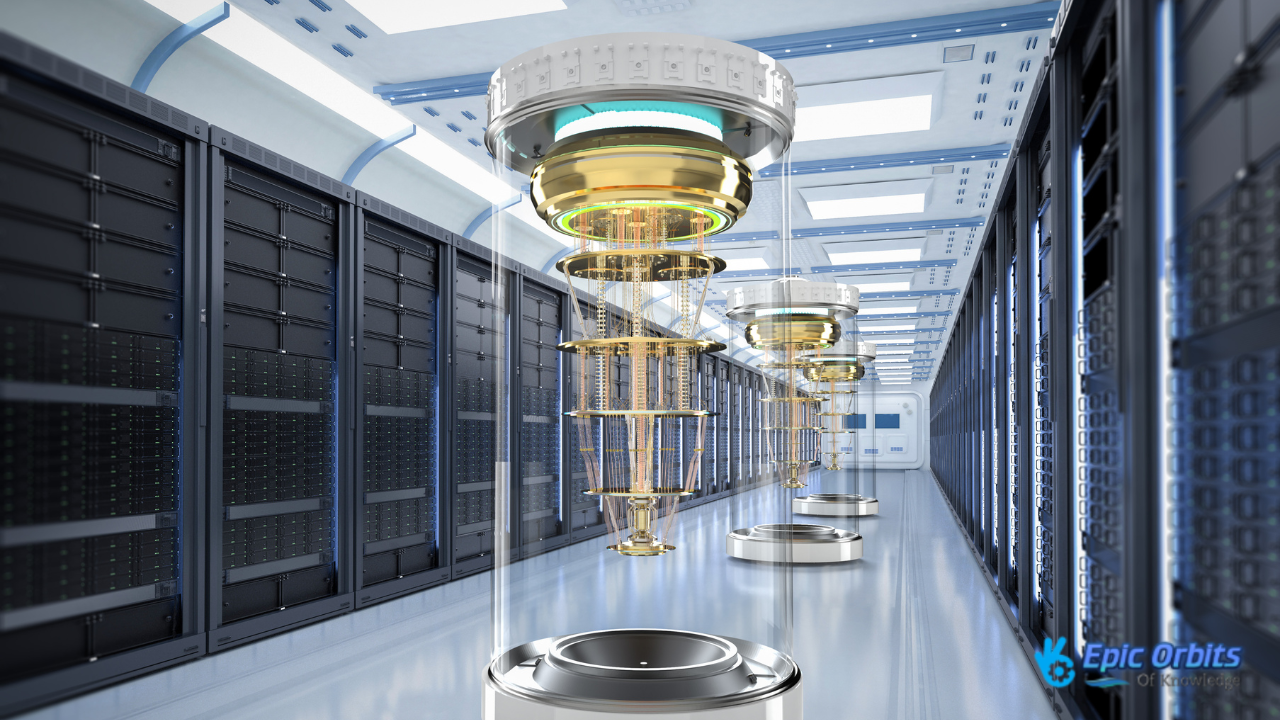Quantum Computers and Classical Computing Battle
Quantum computers utilize the principles of quantum mechanics to process information in fundamentally different ways compared to classical computers.

Quantum computers can do things that regular computers can't. But they require thousands or millions of stable qualities to work at their best. This demand has led to a competition between quantum and classical data processing. Quantum computers can change areas such as medicine, finance, and climate modeling.
Quantum machines use quantum pieces (qubits) that can occur in many states at a Quantum pieces differ from classical bits, which can only represent a value of 0 or 1. This trait allows quantum pieces to represent a value of 0 or 1. This trait allows quantum computers to solve certain problems much more quickly. They can help find new medications by simulating mastic molecules.
Classic computers can perform a trillion operations every second. However, quantum computers can break the current encryption methods quickly, which raises concerns about online security. This feature raises concerns about online security. Quantum computer machines are sharp because they can make more calculations at the same time, thanks to the superposition.
Understand the basics of quantum computers
Quantum machines work differently than regular computers. They use quantum technology. This capability is due to quantum pieces, known as qubits, which can exist in multiple states simultaneously. These qubits can exist in multiple states simultaneously.
Quantum machines change many fields. They improve cryptography, solve adaptation problems, and mimic complex systems.
Superpositions and complications are important for quantum computers. The superposition allows qubits in many states at once. The revenue connects qubits and creates a quantum network.
Quantum gates are important for quantum calculation. They help change qubits for different tasks. Like the quantum algorithm, the noise algorithm uses these gates to solve quick problems.
These algorithms can solve problems much faster than regular computers. They are excellent for tasks such as factoring and following the quantum system.
Classic data processing: Reign Champion
Classic computers have been popular for decades due to their reliable performance. They are still top options for most tasks. Their popularity stems from their well-established reputation and proven reliability.
However, quantum algorithms are designed to deal with problems that classic computers cannot. For example, they can create a large number of factors or search through a huge database. These algorithms can change areas such as cryptography and solve major problems.
Big names like IBM are pioneers in quantum computing research. They create new quantum algorithms. IBM is known for creating quantum processors such as the IBM Q Experience and the Eagle.
In summary, although classical quantum computing advances, we will see new discoveries and innovative methods that move rapidly. As quantum computing progresses, we will witness new discoveries and innovative methods of operation. It will change how we calculate.
Quantum Computing Revolution: What Does It Do Differently?
Quantum is on the verge of a major change. Quantum computing can solve problems that regular computers cannot. This is because quantum computers can handle a lot of information at once. Quantum computers are useful for simulating how molecules work and pushing the boundaries of computation systems.
Companies working with quantum calculation invest a lot of money. They have the capacity to expand the limits of computation.
Quantum makes computers special; they can calculate what regular computers cannot. For example, they can solve complex problems in minutes that will take thousands of years for regular computers. It is thanks to qubits, which can capture more than one state at a time. This illustration
Qubits is like a super-Hakti calculator. Two qubits cope with four pieces, handle three eights, and handle four sixteens. This illustration shows how powerful quantum computer machines can be.
Quantum calculation has many advantages. It can help in areas such as the discovery of drug reception and material science. It can also adapt to complex systems, such as managing investments and analyzing risks.
- Molecular behavior can be poisoned, drugs can be prosecuted, and it can lead to successes in fields like material science.
- Complex systems like portfolio management and risk analysis can adapt to quantum computing.
- Rather than offering unique solutions to complex problems, quantum computers limit their potential.
Companies like IBM are already using quantum computers on clouds. This advancement is promising for the future of data processing, as it can transform industries such as finance and medicine.
As more money goes into quantum calculation, we will see even more progress. We are getting closer to achieving quantum dominance. enormous.
Ge players in the Quantum Computing Industry
Quantum computing news is exciting, with large companies investing a lot. Google and IBM are at the forefront, making enormous strides in quantum computer machines. Google has hit a big milestone: major improvements in quantum calculation. Meanwhile, IBM has introduced big names like Google and NASA to use D-Wave systems.
Quantinuum and Intel are also maki Quantinuum's H-Series Trapped Ion Everyone can access quantum computers until they establish all necessary connections. p in 2024. Big names like Google and NASA use D-Wave systems. Quantinuum's H-Series Trapped Ion Quantinuum's H-Series Trapped Ion Everyone can access quantum computers until they establish all connections.
Some big events include
- IBM's Quantum Computing Service offers dozens of devices that are available to the public at no cost.
- Google's Quantum AI aims to reduce quantum calculation errors and treat multiple physical KVBits as a single logical qubit.
- Microsoft launched Azure Quantum Elements to boost chemical and material science advancements through Azure High-Performance Computing (HPC).
The US government has invested $2.9 billion in quantum calculation from 2019 to 2022. Private investments have also increased, with 2022 hits worth more than $2.35 billion. With these investments, the future of quantum calculation is visible. We can expect tremendous progress in the health care system, finance, and logistics.
Real-World Application of Quantum Computing Technology
Quantum calculation changes many areas, such as cryptography, drug discovery, and finance. It can break some encryption but can also create new, unbreakable people. It also helps to create complex systems, such as the supply chain, to work better.
Quantum calculation promotes cryptography and safety by making new, strong encryption. For example, NIST has set a standard for four quantum-resistant encryption models for 2024.
Quantum calculation has the speed to find new medicines by simulating how the molecules have worked together. In 2019, IonQ imitated a water molecule on a quantum apparatus, showing its power in chemistry.
Quantum calculation improves economic models by adapting complex systems. For example, JP Morgan used its Chase platform, while IBM utilized quantum computing for alternative contracts, demonstrating the value of these technologies in finance.
There are some main uses of quantum calculation:
- Artificial intelligence.
- Better.
- Cleaner fertilization.
- Cybersecurity.
- drug development.
- The search for electronic materials is being conducted.
- economic modeling.
- Solar.
- Traffic optimization.
- Weather forecast.
- Fight for quantum dominance.
Quantum calculation research is progressing rapidly, with many companies and research groups racing to create the most advanced quantum computer machines. The expectation is that quantum computers can solve problems that regular computers cannot. These problems are very complex and important.
A large focus area is to create quantum computers that can mimic the complex quantum system. This is important for areas such as chemistry and material science. Quantum machines can help you guess how the molecules interact and how the material behaves.
Today's quantum computers have about 50 qubits. Each additional qubit enhances the power of your computer. However, these computers are still new and can make mistakes easily. Despite these challenges, both Google and IBM are advancing in this field; Google announced that it achieved quantum dominance in 2019.
Quantum computing provides many benefits, including
- Quantum computing offers swift solutions to intricate problems.
- The simulation of quantum systems is improved.
- Quantum encryption provides robust security.
Since quantum computing research is improving, we will see major changes in many areas. This includes drugs, finance, and climate modeling. Quantum machines can solve problems that now appear impossible. This technology can change many industries, as well as the ways we live and work.
Quantum Computers: restrictions and challenges
Quantum calculation has the power to solve complex problems much faster than regular computers. However, it faces major challenges. A big question is the delicate character of quantum bits, or qubits. They easily lose their quantum properties due to decoherence.
Decoherence is a major problem because small disturbances can lose the quantum state. This makes it difficult to keep qubits in the stable quantum position for a long time. This complex quantum algorithm is important.
Another major challenge is to increase the number of qualities. The system becomes more complex as we add more qubits. This limitation makes it difficult to fix errors and maintain quantum consistency. It is important to overcome these scaling problems in order to achieve quantum dominance.
The cost of quantum computing systems is also a major obstacle. The cost of talent, hardware, and complex supply chains is high. This results in the widespread adoption and development of quantum computing techniques.
How can classical and quantum computers work together?
Classic and quantum calculations are not competing. They can form layers to make outstanding strides in some areas. Quantum computing companies are pushing for new ideas and investments. The latest news suggests how the combination of both can lead to better solutions for complex systems.
Hybrid data processing solutions are a significant advancement in technology. They both use the best in the world. Classic computers handle data preparation and visuals, while quantum computer machines deal with complex simulation and calculation. This team can unlock new discoveries in areas such as cryptography, drug research, and finance.
Hybrid data processing provides many benefits. It promotes performance and efficiency, making the system safer and more reliable. We expect quantum computers to significantly alter our calculation methods in the future. Quantum computing companies dive into hybrid solutions, and the latest news reflects their progress.
Quantum computers: Future data processing
Looking ahead, quantum computers will significantly alter our methods of calculation. They are able to perform things that ordinary computers can't. This means major changes in chemistry and material science.
Companies such as Google, IBM, and Microsoft are working on quantum technology. Banks like JP Morgan Chase and Goldman Sachs will also join the efforts in quantum technology. They see the power of quantity in intensifying drug discovery and research.
- They are adapting to AI and machine learning.
- Increase data encryption methods for cybersecurity.
- The supply series improves logistics and transport.
- Reduce prototype costs and improve design accuracy in production.
Although jumping still faces challenges, the future of quantity appears promising. Larger amounts of money from both sides promote growth. In 5-10 years we will see the quantity everywhere; science and more will change.
Begin with quantum calculation development
Quantum technology is growing rapidly, making it easier to start with quantum computing. With the right tools and platforms, you can dive into quantum calculation. Big names such as IBM, Google, and Microsoft provide support and resources for developers.
Qiskit, from IBM, is an important tool for quantum computers. Qiskit's YouTube channel posts weekly new videos. IBM is also working on a new interactive textbook to help students.
For intensive learning, web communities and forums are beneficial. Python is a popular language in quantum computing. Developers can utilize IBM Quantum Experience, Microsoft Quantum Development Kit, and platforms such as Google Cirq. These devices help you discover quantum calculation and join society.
Some of the most important resources are included to start with quantum calculation:
- IBM Quantum.
- Microsoft Quantum.
- Quantum Computing Report Podcast.
- Stack Exchange for Quantum Computing.
These resources provide a lot of information and support. They help you learn and grow in quantum technology and data processing.
Conclusion
The battle between quantum and classic data processing is over. Quantum computers promise to change areas such as cryptography and quantum algorithms. However, the journey to quantum dominance is full of obstacles.
Researchers are constantly looking for quantum technology. They aim to create reliable, powerful quantum computer machines that defeat classic systems. This goal is still a task in progress.
Quantum calculation has enormous potential. It can break the current encryption, accelerate the discovery of the drug, and improve economic modeling. As the research goes on, the data processing world will change. Quantum and classic systems may work together.
A solution that integrates the best aspects of both can emerge as the true winner. This can lead to new solutions that help many industries grow.



